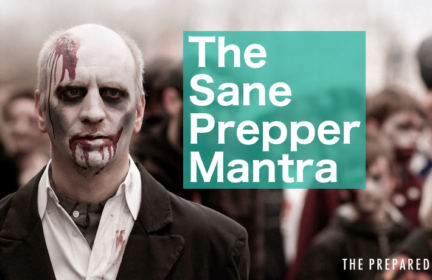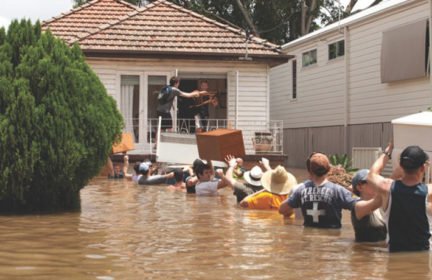We Should All Be Preppers – an interesting article in the Atlantic
https://www.theatlantic.com/ideas/archive/2020/05/we-should-all-be-preppers/611074/
Preppers all over the world have been hunkered down safely at home or in their bunkers during the COVID-19 pandemic. For them, long-term food storage is a baseline, so making it through a season or two without venturing out is primarily a psychological challenge. I’ve spent the past three years interviewing people preparing for an ambiguous future disaster, and some of them emailed me in the early days of the pandemic from their redoubts, expressing wry frustration as they watched shoppers on TV frantically stacking supplies—hand sanitizer, bottled water, and, yes, toilet paper—in their shopping carts. One wrote me, “These people are fixing a leaky roof in a rainstorm.”
Chances are you have a neighbor who was ready for this pandemic. And if you knew they were stockpiling before the disaster, you likely thought they were weirdos. I know I did, even as I traveled the world writing a book about them. Not anymore. Although preppers have long been the subject of ridicule, I imagine many of us will take on some of their habits, or at the very least make space in our closets and garages for nonperishables.
Scooping up scarce necessities gives people a sense of control during times of uncertainty, so the great toilet-paper dash-and-grab of 2020 was a self-fulfilling prophecy. The rarer something is, the more people seek it. Six weeks after the initial pandemic hoarding spree, many key commodities are still in short supply. President Donald Trump recently signed an executive order to prevent meat shortages. With about 15 percent of the population now unemployed, Americans are looking for assistance from food banks, in lines stretching for miles in some places. These spectacles of desperation are both a censure of our society and a revelation about our collective lack of personal preparedness.
The crisis has also highlighted how woefully inadequate many of our living arrangements are for social distancing. I have friends in London, New York, Los Angeles, and Sydney who have little ability to cook, let alone store food. That level of base-needs dependency on society is anathema to preppers, who are quick to point out that only a few hundred years ago not having enough food and fuel stored to make it through winter was effectively suicide.
A couple of years back, I flew to Chiang Mai, Thailand, to interview a wealthy Canadian offshore oil-rig worker and doomsday prepper who asked me to refer to him as “Auggie.” I was baffled by Auggie’s desire for a pseudonym, because he was in the middle of building the most conspicuous house I’d ever seen. Operating on the extreme end of disaster preparedness, he was constructing an “eco-fortress” composed of four villas that he would stock with enough supplies for a multi-month siege. He designed three of these villas for future buyers. Auggie’s own stronghold was a three-story concrete block with bulletproof windows and an open-air central atrium. He planned to scaffold the interior walls with lattice for passion-fruit vines that would drape down over a swimming pool. He assured me that the off-the-grid building, which sat in the middle of an abandoned orchard at the far edge of a secluded village, would have remote surveillance systems, mantraps, a panic room, and a nuclear-fallout shelter that doubled as a day spa.
He called his customized hideaway “Sanctum,” which in Latin means “a holy place,” but in English denotes a private retreat. For Auggie, the doomstead served both purposes, being a place for safety, study, and self-improvement during the crisis he was sure was just around the corner. And here we are.
Even before the outbreak of COVID-19, preparing for emergencies, in the casual sense, could no longer be considered a niche activity in the United States. A 2017 survey by the financial-tech company Finder suggested that roughly 20 percent of Americans spent money on survival materials that year, and a further 35 percent said they already had what they needed for an emergency. But my guess is that many of these same people are now finding that their preparations were inadequate. Someone might keep a flashlight and a first-aid kit hanging from a garage hook or tucked under the bed, or may have even purchased a three-day tactical assault “bug-out bag” available on Amazon for $49.99, but only staunch cynics have stockpiled food, water, medicine, fuel, tools, weapons, and equipment for months of isolation.
Auggie’s eco-fortress in Chiang Mai, Thailand. (Courtesy of Bradley Garrett)In 2013, at least 3.7 million Americans self-identified as survivalists, according to 24/7 Wall Street, a financial-news source. Many of these citizens, who suspected that the government lacked the resources to protect them after decades of cuts to the public sector, have hoarded with the gusto of frontier settlers. Prepping is a multibillion-dollar-a-year industry in the U.S. In a 2017 interview with Bloomberg, Aaron Jackson, then the CEO of Wise Co., a Salt Lake City–based producer of freeze-dried fare with a 25-year shelf life, declared that his food was a staple “that every American household in this age of uncertainty should have.” Jackson estimates that survival food sales alone total about $400 million annually. The company delivers certainty in a pallet of black plastic buckets for $9,499.99. Supposedly, this mail-order pantry can provide three meals a day for one year for a family of four. Long-term food buckets for your “deep larder” can now be bought at Kmart and Bed Bath & Beyond. Costco recently had a page dedicated to “Emergency Food by the Pallet,” advertising “one year of food storage” for $4,999. These pallets sold out two months ago, as did many of the televangelist Jim Bakker’s “survival food buckets.”
If you are a prepper, you probably haven’t told anyone. My brother, who knew for years that I was writing a book about prepping, let me in on a secret only a few weeks ago: He had a storage unit filled with two years’ worth of food, a handful of N95 masks, long-range two-way radios, and a small arsenal. The crisis having finally arrived, he’d activated the cache. That he never dared mention it to me previously was both vexing and unsurprising.
The reason for secrecy, according to a paper published last year by Kezia Barker at Birkbeck, University of London, is because “hoarding” has been deemed pathological. We’re meant to trust business, trade networks, and markets to provide what we need, to not question the resiliency of globalization. But as these systems shudder under the weight of a worldwide catastrophe, the curtain has been pulled back on the dangers of free-market faith. Prepping is, at its heart, a kind of activism, a bulwark against the false promises of capitalism, of the idea of endless growth and the perpetual availability of resources.
As Barker suggests, stockpiling exposes the magical thinking behind the assurances of universal state security. This is why this kind of preparation folds so well into conservative narratives distrustful of big government, experts, and elites. The right-wing commentators Sean Hannity and Alex Jones advocate doomsday prepping to their audiences, and market products to meet those needs. For people eager to dismantle state infrastructure, the failure of that infrastructure in an emergency is vindication of foresight. President Trump has consistently relegated responsibility for management of the pandemic to state governments and the private sector, all while claiming unprecedented executive authority and proffering erroneous information to the public on a daily basis. It’s the perfect cocktail for compounding the crisis, proving the conservative thesis that big government is bad government.
The political left also has its doom prophets, of course. The cultural theorist Paul Virilio once said that, due to our economic reliance on connection and speed, it was realistic to think that “there is an accident brewing that would occur everywhere at the same time,” words that reverberate dramatically under present circumstances.
I’m now holed up in a bunker of sorts in south Los Angeles—in my 78-year-old mom’s well-stocked and isolated house in a gated community. Like my brother, we’ve acquired radios and a deep larder, planted a garden, and have no need to panic shop. However, we’ve had to leave the house every three days or so to pick up my mom’s prescriptions and take her to doctors’ appointments. I imagine more committed preppers like Auggie in Chiang Mai shaking their heads at this.
I sent him a message recently to ask whether it’s realistic to think that we can prepare for every eventuality. He wrote back immediately: “I created an Ebola hazmat kit a few years ago when I thought the outbreak would take off.” His friends at the time thought that this was a superfluous line of defense. Now he’s unpacking the bunny suit and powered air-purifying respirator. I thought about him laying out that kit in his fortress and recalled some of the skeptical questions I’d fired at him during my visit. I felt my cheeks redden. Then the next message arrived.
“Preppers don’t seem so crazy when there’s a pandemic, correct?” Auggie has now sold two of the three other villa plots at Sanctum.
Over the past three or four years, I’ve hung out in luxury condos inside missile silos, in bunker complexes on the Great Plains, with groups growing food in secret forests, with people building heavily armored vehicles, and with religious communities that have collected supplies that they’re ready to hand over to strangers. Most of the people I’ve met aren’t getting ready for an extinction-level event, and sneer at the suggestion. Rather, prepping for them is about building up hopeful confidence that they’ve planned ahead for the inevitable catastrophes of existence. This pandemic, which they consider mid-level, is rightfully causing us to reckon with the failures of our social, political, and economic systems, and we should all collectively push to make them more resilient to contingencies. But in the meantime, a bit of practical prepping can take some strain off these systems while we wait for the next cosmic surprise.
Bradley Garrett is the author of the forthcoming book Bunker: Building for the End Times.
-
Comments (5)
-

